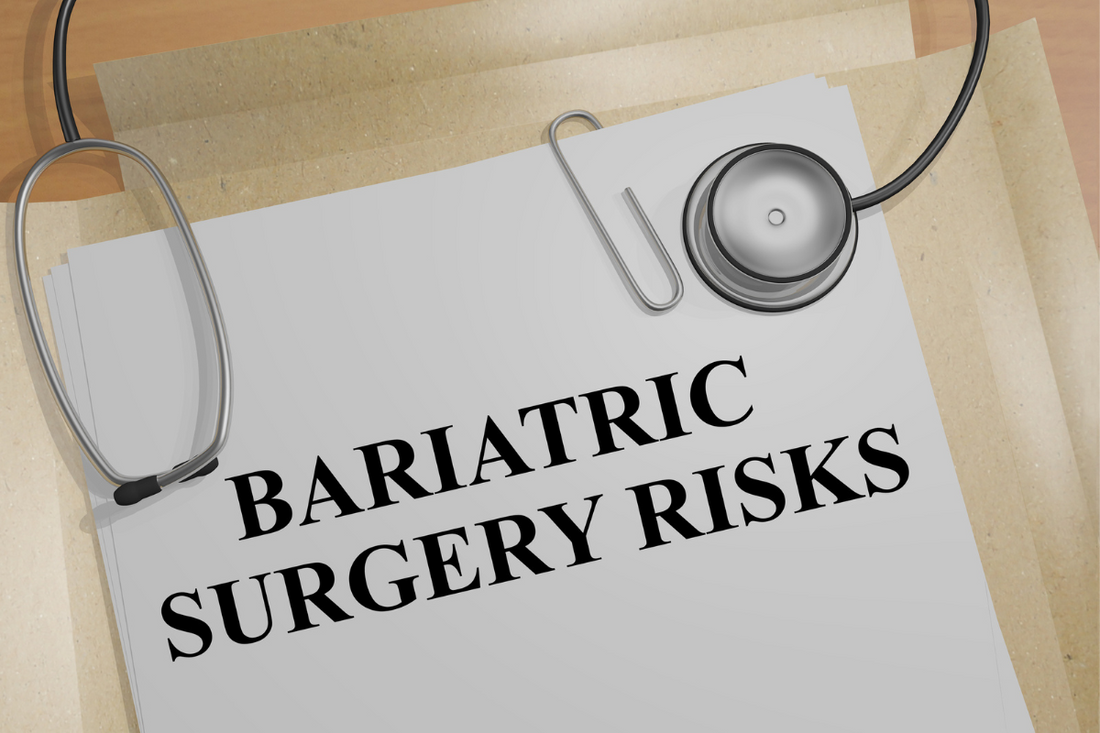Table of Contents
- List of Bariatric Surgery Risks
- Is Bariatric Surgery a High-Risk Surgery?
- What Percentage of Bariatric Surgeries Fail?
- Why is Bariatric Surgery Risky?
- What is the Most Common Complication of Bariatric Surgery?
- What is the Safest Bariatric Surgery?
- Can Bariatric Surgery Cause Death?
- Risks of Surgery vs No Surgery
Bariatric surgery can change your life by helping you lose a lot of weight through surgery. Yet, the procedures don't come without known bariatric surgery risks.
These procedures aim to improve your health, reduce obesity-related risks, and enhance your life. However, as with any surgery, it is essential to be aware of the potential risks involved, even with a skilled bariatric surgeon at the helm.
Common bariatric surgery procedures include gastric bypass, sleeve gastrectomy, and adjustable gastric banding. Each comes with its own set of advantages and disadvantages. Before you decide on weight loss surgery, it's crucial to understand the potential dangers and problems. Knowing the potential hazards of bariatric surgery can help you understand and work with your healthcare provider and bariatric surgeon to determine the right procedure.
This article explains the risks of bariatric surgery and helps you decide if it's right for you.
List of Bariatric Surgery Risks
While bariatric surgeries can be life-changing, they come with potential risks and complications. Below is a list of some of the common risks associated with bariatric surgery.
- Bleeding: During or after surgery, there's always a risk of bleeding. It's essential to follow your healthcare provider's instructions to minimize this risk. Make sure to inform them of any medications or supplements you're taking, as some may increase the risk of bleeding.
- Infection: As with any surgical procedure, infection is a possibility. Your surgical team will take measures to minimize this risk. After the operation, you will be advised on the best ways to keep your incisions clean and prevent an infection from developing.
- Leak: In some cases, leakage can occur at the site where the gastrointestinal tract is reconnected. This can lead to serious complications and may require additional surgery to repair. Monitor for signs of leakage, such as persistent abdominal pain or fever.
- Nausea and vomiting: Nausea and vomiting are common side effects after bariatric surgery. Your healthcare team may prescribe medication to help alleviate these symptoms. It's also essential to follow the recommended postoperative dietary plan to reduce the risk of nausea and vomiting.
- Rapid weight loss: While losing weight is the main goal of bariatric surgery, rapid weight loss can result in some undesirable side effects. These include gallstones, nutritional deficiencies, and loose, saggy skin. To mitigate these issues, work closely with your healthcare team to follow a balanced diet and exercise plan.
Remember that bariatric surgery affects people differently, and the risks vary for each person. When you have information, you can handle any problems that come up while getting healthier.
Is Bariatric Surgery a High-Risk Surgery?

If you're struggling with obesity and nothing else has helped you lose weight, bariatric surgery could be a good option. It's known to be effective in treating obesity. However, like any surgery, it comes with some risks. Understanding these risks can help you make an informed decision.
Heart Disease: Bariatric surgery may lower your risk of developing heart disease by improving conditions such as hypertension and high cholesterol. However, if you already have heart problems, the surgery might put extra strain on your heart. It's essential to speak with your doctor if you have a history of heart disease before proceeding.
Hypertension: As mentioned earlier, bariatric surgery can improve hypertension. However, during the surgical process, your blood pressure might fluctuate. This is why it is crucial to be closely monitored by your healthcare team and follow their recommendations pre- and post-surgery.
Body Mass Index (BMI): A high BMI indicates a higher risk for potential complications during surgery. The risk of complications tends to increase when a person's BMI is above 50, which is considered extremely obese. Before deciding on bariatric surgery, your doctor will check your BMI and discuss other weight loss choices.
Bariatric surgery has risks, but it also brings many benefits. People lose weight and get healthier, improving their lives. Thoroughly discussing your options with your healthcare team will help you make the best decision for your unique situation.
What Percentage of Bariatric Surgeries Fail?
Before deciding on weight loss surgery, it's crucial to know the risks and failure rates of each procedure. The rate of failed bariatric surgeries differs based on the surgery type, patient factors, and care after surgery.
Weight-loss surgeries are generally more successful than conservative weight-loss methods. However, specific failure rates differ based on the procedure:
- Gastric band: Failure rates for adjustable gastric banding range from 10% to 50%. This wide range is due to factors such as improper band placement, leakage, or slippage.
- Sleeve gastrectomy: The failure rate of sleeve gastrectomies is lower than gastric bands, usually around 15% to 20%. The main causes of failure are not losing enough weight and having complications like leaks or strictures.
- Gastric bypass surgery: Gastric bypass, including Roux-en-Y gastric bypass, has a failure rate of around 5% to 15%. The surgery is more complicated, but it can help you lose more weight. However, it also has more risks of problems during surgery.
Keep in mind that the definition of "failure" can vary. Some people see failure as not losing enough weight (like 50%), while others think it's health problems coming back. Certain risk factors, like smoking, previous abdominal surgeries, and not following post-operative instructions, can increase poor outcomes.
To increase your chances of success with weight loss surgery, it's important to pick a skilled surgical team and follow their instructions for care before and after the operation. To get lasting results, it's important to have a healthy lifestyle. This means eating well and exercising regularly. Getting surgery can help you lose weight at first, but committing to a new healthy lifestyle is crucial for long-term success.
Why is Bariatric Surgery Risky?
Bariatric surgery is a complex procedure that helps improve the health and quality of life for obese people. However, it carries certain risks and complications. If you're thinking about using this method to lose weight, it's crucial to know the factors that make it risky.
First, bariatric surgery helps you lose weight by changing your stomach and intestines. Like any surgery, there can be complications during the procedure. These may include bleeding, infection, or injury to surrounding organs.
Additionally, the alterations made to your digestive system can lead to long-term complications. After surgery, your body might not absorb nutrients well, causing deficiencies or malabsorption. This can lead to symptoms such as fatigue, weakness, and an increased risk of medical conditions like osteoporosis.
Another aspect to consider is the importance of adhering to a strict diet and exercise regimen after bariatric surgery. You may get complications like dumping syndrome if you don't follow your surgeon's advice. This condition makes food move too fast in your digestive system, causing nausea, vomiting, and diarrhea.
In addition, bariatric surgery might not always lead to the desired weight loss. It could also cause weight gain later on. If you don't keep up with the necessary lifestyle changes for weight loss, this can happen. It can also happen if your body stops responding to the surgery.
Lastly, psychological factors may also contribute to the risks of bariatric surgery. Weight loss surgery is a life-changing decision that requires long-term commitment and support. Remember, the surgery is just a tool. Your long-term success depends on making healthy choices.
Overall, bariatric surgery carries inherent risks like any surgical procedure. To decide if this weight loss solution is right for you, talk with your healthcare team about these factors.
What is the Most Common Complication of Bariatric Surgery?

Bariatric surgery can be life-changing, but it's important to know the possible complications. One of the most common complications you may encounter is leakage. This occurs when digestive fluids leak from the surgical site, which can lead to infection or abscess.
Some common symptoms of leakage include:
- Fever
- Rapid heart rate
- Abdominal pain
- Difficulty breathing
Leakage often occurs within the first week after surgery, and it's critical to promptly inform your surgeon if you suspect a leak.
Another frequent complication is bowel obstruction. This occurs when scar tissue or adhesions cause a blockage in your intestines, making it difficult for food to pass through. Signs of bowel obstruction include:
- Nausea and vomiting
- Severe abdominal pain
- Inability to pass gas or have a bowel movement
Bleeding can happen right after surgery or a few days later, which is another complication. Sometimes, bleeding may be internal and not immediately noticeable. Take note of any signs such as dizziness, weakness, and tarry or bloody stools.
Infections, while less common, can still occur. Monitor your surgical site for redness, swelling, or discharge, as these may indicate an infection. Notify your healthcare team immediately if you suspect an infection.
Long-term issues may also arise, such as nutritional disorders. One example is anemia, which occurs when your body lacks sufficient iron. To avoid this, it's important to stick to your post-surgery diet and take the suggested supplements.
To prevent osteoporosis, which is when your bones become weaker, make sure you take the right supplements and do weight-bearing exercises as recommended by your healthcare team. This can happen when your body doesn't absorb enough calcium and vitamin D.
To recover well after surgery, it is important to understand possible problems and take care. Stay in regular contact with your healthcare team and promptly report any concerns. By doing so, you're taking control of your health and giving yourself the best chance for long-term success.
What is the Safest Bariatric Surgery?
When considering bariatric surgery, safety is a primary concern. You should know that various types of bariatric surgeries are available, each with its unique pros and cons. All surgeries have risks, but some have fewer complications and faster recovery times. In this section, we will tell you about the safest bariatric surgery options. These options include duodenal switch, gastric band, sleeve gastrectomy, gastric bypass surgery, Roux-en-Y gastric bypass, and biliopancreatic diversion.
Sleeve Gastrectomy: In recent years, the sleeve gastrectomy has gained popularity as one of the safer bariatric surgery options. With this procedure, your surgeon removes around 75-80% of your stomach, leaving behind a tube or "sleeve" that can hold a significantly smaller amount of food. This type of surgery reduces the feeling of hunger and lowers the amount of food you can consume, leading to weight loss. Since no changes are made to your intestines, there are fewer complications and a lower risk of malabsorption.
Gastric Band: Another relatively safe option is gastric band surgery, which involves placing a silicone band around the upper part of your stomach. This creates a small pouch that limits the amount of food you can consume at once. The band can be adjusted or removed if necessary. While the weight loss may be slower than other methods, it involves fewer risks and shorter recovery times.
Roux-en-Y Gastric Bypass: The Roux-en-Y gastric bypass is a well-established procedure with a proven track record. To reduce how much food is absorbed, a small stomach pouch is created, and a portion of the small intestine is bypassed. This surgery helps you lose more weight, but it has more risks and can cause malnutrition or other problems. This option may work for patients with serious weight-related health problems due to its history and success.
Of course, the safety of bariatric surgery also heavily depends on your individual circumstances, such as pre-existing health conditions and your choice of a qualified surgeon. It's essential to carefully weigh the pros and cons of each option and discuss them with your healthcare provider. They can advise you on which procedure would be the most appropriate and safest for you, considering your unique needs.
Can Bariatric Surgery Cause Death?

Bariatric surgery, like any surgery, comes with potential risks. Although the overall risk of death from these surgeries is low, it's important to be aware of the possible complications that can occur.
One potential issue arising from bariatric surgery is the development or worsening of heart disease. After undergoing surgery, you may experience changes in your heart function, such as arrhythmias or blood pressure fluctuations. It's crucial to closely monitor your cardiovascular health after surgery.
Following gastric bypass surgery, there's a risk of developing hypertension. Elevated blood pressure characterizes hypertension. High blood pressure can strain your heart and arteries, increasing the risk of heart problems.
Weight loss after bariatric surgery can be rapid and significant, which, in some cases, may lead to complications. While this weight loss is usually beneficial, it's vital to ensure that it doesn't happen too quickly. Losing weight too fast can cause nutrient deficiencies and other health issues. It's important to work with a healthcare professional to track your progress.
There are also more general surgical complications associated with bariatric surgery. These can include infection, bleeding, and blood clot formation. While these complications are relatively rare, they can increase the risk of death.
In conclusion, while the risk of death from bariatric surgery is low, it's important to be aware of the potential complications. To lower the risks and increase your chances of success, follow your healthcare provider's advice and monitor your health .
Risks of Surgery vs No Surgery
The above sections explain the risks of bariatric surgery. It's also important to know the risks of not having the surgery. If you choose not to have bariatric surgery, you may be at risk for certain conditions.
Below is the list of potential risks if you decide not to have surgery:
- Diabetes: Obesity significantly increases the risk of type 2 diabetes. Over time, uncontrolled blood sugar from diabetes can cause various complications, such as kidney damage, heart disease, and vision problems.
- Gastroesophageal reflux disease (GERD): GERD is the frequent flow of stomach acid back into and causing irritation to the lining of your esophagus. Heartburn is usually a common symptom, as well.
- High blood pressure: Carrying excess weight can lead to elevated blood pressure levels, which, in turn, increase the risk of heart disease and stroke.
- Joint pain: The additional weight strains joints, particularly in the knees, hips, and lower back. This can lead to conditions like osteoarthritis.
- Nonalcoholic fatty liver disease (NAFLD): NAFLD is an umbrella term for a range of liver conditions affecting people who drink little to no alcohol. The primary characteristic is fat accumulation in the liver, which can lead to liver inflammation or scarring.
- Nonalcoholic steatohepatitis (NASH): This is a more aggressive form of NAFLD, where the liver becomes inflamed and damaged.
- Sleep apnea: This is a severe sleep disorder in which breathing repeatedly stops and starts. Obesity is a primary risk factor for obstructive sleep apnea, which can lead to heart problems and other complications.
Making the choice between surgery and no surgery is undoubtedly challenging. It's important to consider the possible problems of surgery and the risks of ignoring obesity-related health issues. To make the best choice for your health, consult healthcare professionals for advice.



 Order Free Sample
Order Free Sample





